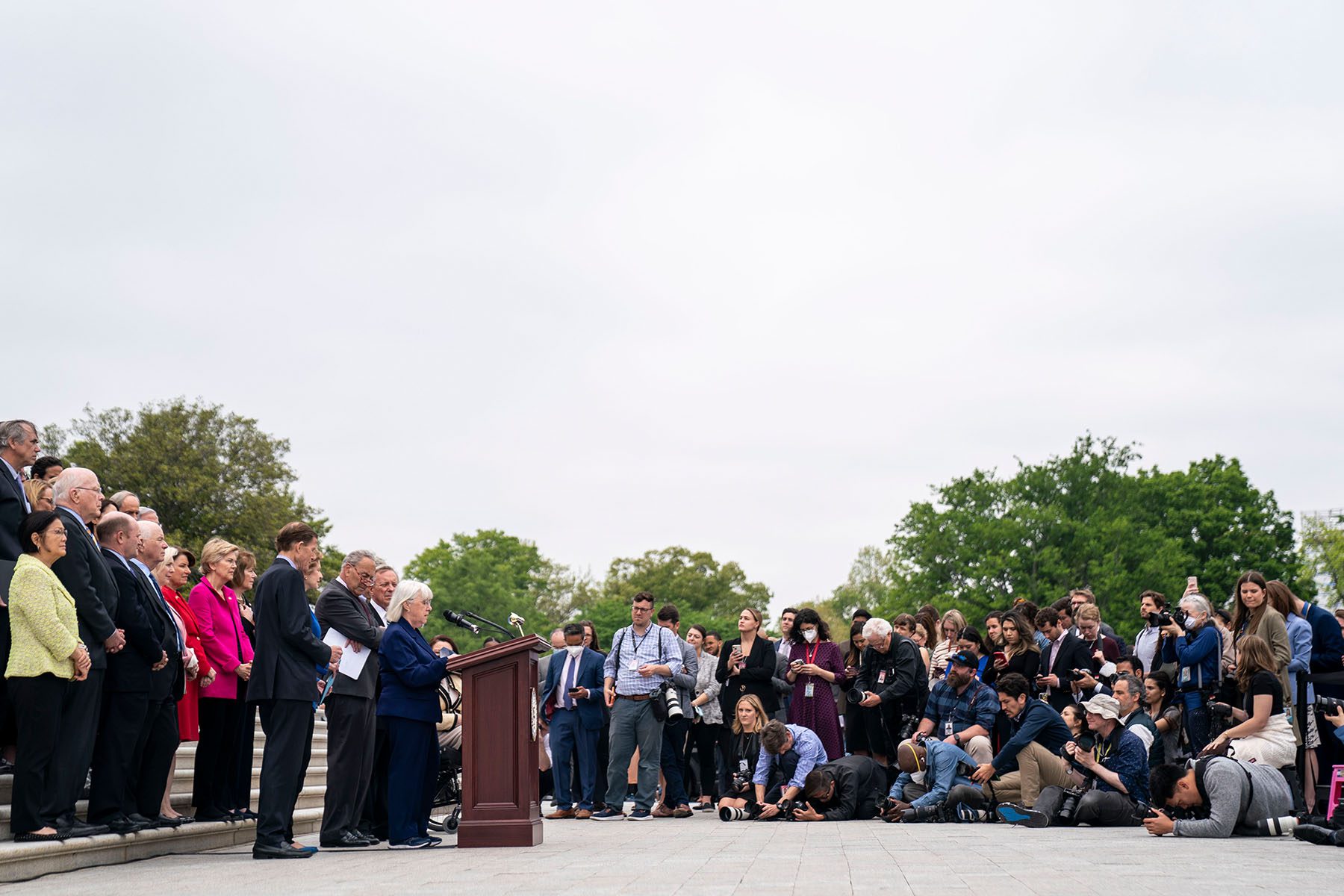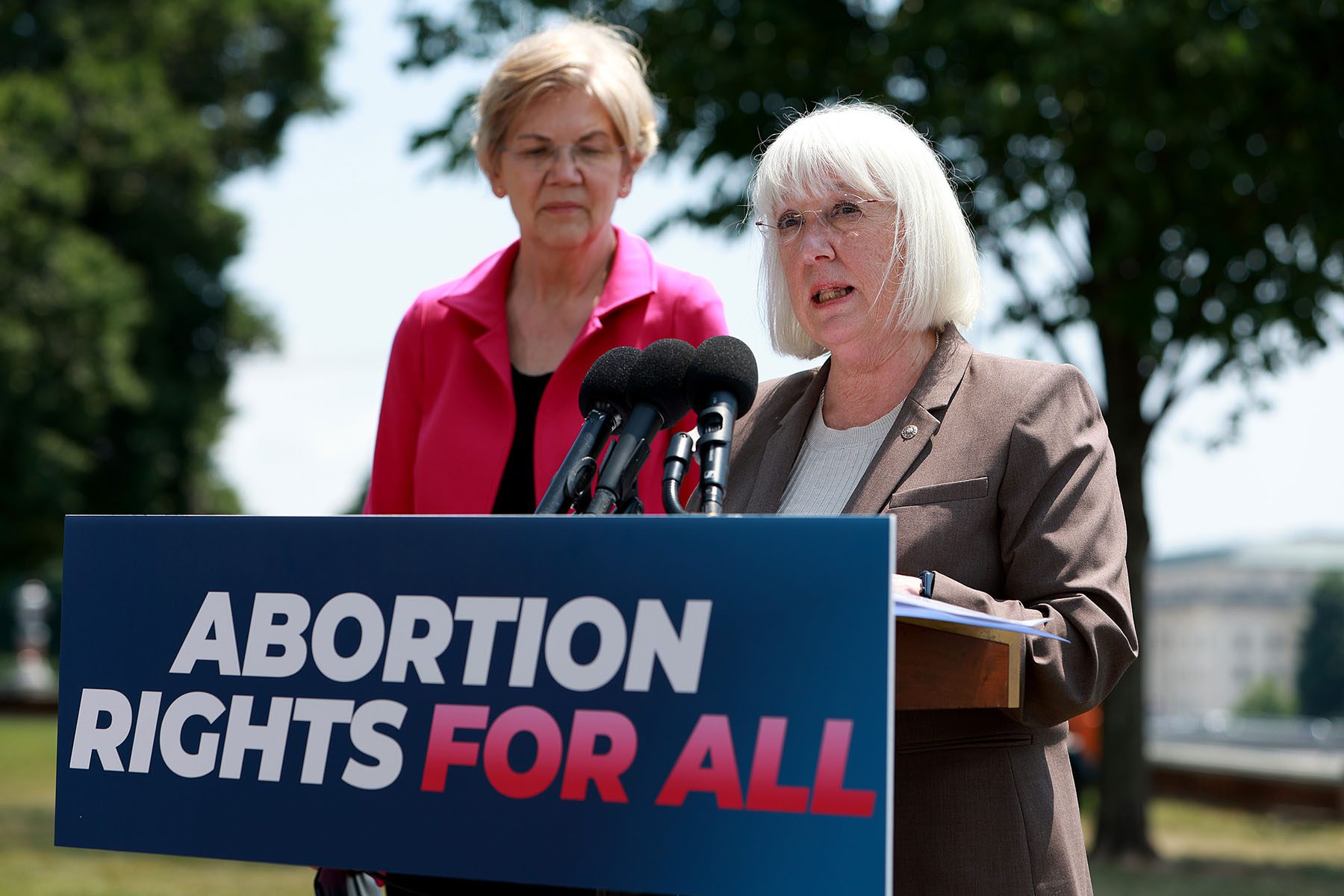Patty Murray ran for the U.S. Senate in 1992, the first “Year of the Woman,” which sent a record number of women to Congress. She was incensed that the Democratic-led chamber had just confirmed conservative Supreme Court Justice Clarence Thomas despite credible allegations of sexual harassment and his refusal to say whether the court’s 1973 decision in Roe v. Wade was settled law.
Thirty years later, Murray is running for reelection in Washington state in the wake of the Supreme Court overturning Roe with the backing of Thomas and several justices installed by Republican former President Donald Trump. That includes Brett Kavanaugh, whose 2018 confirmation hearings were rocked by decades-old allegations of sexual assault, helping fuel another “Year of the Woman” for Democratic candidates at the ballot box that year.
Murray believes the aftershocks of the Supreme Court’s June 24 ruling in Dobbs v. Jackson Women’s Health Organization, the decision that overturned Roe, will make a difference in this year’s election. She predicts this one will be the Year of the Women — that women voters who will turn out in record numbers to back candidates who support abortion rights, who are nearly universally Democrats.
Women across this country are as furious as she is, Murray told The 19th, that their rights were “ripped away overnight.”
“I go to the grocery store on Saturdays and people always say ‘hi’ to me … but now women in particular come up to me and go, ‘Oh my God, please help us,’ and the intensity of that personal feeling is so clear,” Murray said in a recent interview.
“People are stunned, and angry, and we’ll see that in the elections,” she added.
There are early signs that Murray is right. In a first ballot-box test of public sentiment after Dobbs, voters in Kansas, which backed Trump over Biden by 15 points, last month soundly rejected amending the state constitution to say that abortion rights are not protected. Republican candidates are scrambling to temper extreme abortion positions they have taken in the past. Uncertainty about the future of abortion access has led to a surge of women registering to vote in some swing states. The issue could mitigate the expected Democratic midterm losses that typically occur when a party controls the White House.
The 19th caught up with Murray as she was campaigning in the greater Seattle-Tacoma area ahead of Washington’s August 13 primary. The state uses a nonpartisan, top-two primary system, and Murray bested Republican Tiffany Smiley, whom she will face in November, by nearly 20 points. Three other candidates finished with only single-digit support.
Murray holds one of the safest Democratic Senate seats in the country, according to the nonpartisan Cook Political Report, and she is expected to glide to reelection for her sixth term. She was speaking at canvassing kickoffs in a state that has not sent a Republican to the Senate since 1994, and where she last won reelection in 2016 by a whopping 18 points.
In a legislative chamber most known for its show ponies, Murray is a workhorse, an assistant Democratic leader who stands at the lectern during leadership news conferences but is otherwise content with her “low-key” reputation. The former stay-at-home mom and citizen lobbyist for education and environmental issues got into politics after a state lawmaker questioned whether a “mom in tennis shoes” could have an impact. Murray used the moniker during her campaigns for school board and the statehouse, and eventually the Senate. Her office still uses the phrase — sometimes with “nana” added — in her bios today. Her political career has centered the experiences of moms and grandmas like herself as Murray worked on issues like paid family leave and subsidized child care.

If Democrats hold on to the Senate, Murray’s national profile may grow. She chairs the Senate’s Health Education Labor and Pensions Committee, which has purview over health care legislation, including abortion rights. After the court’s Dobbs decision leaked in early May, Democrats quickly put together a group of women senators to fight Republican efforts to restrict access at the state level by passing national legislation, with Murray at the helm. Thus far no such bills have passed.
Sen. Tina Smith of Minnesota, a Democrat and former vice president of external affairs at the regional Planned Parenthood who joined the Senate in 2017, told The 19th that Murray has been an “unabashed champion for reproductive rights” and that at this moment “her leadership is more important than ever.”
Democratic Sen. Elizabeth Warren of Massachusetts praised Murray for urging the Biden administration to take “bold executive actions” in the wake of Dobbs.
“There’s no one I’d rather be fighting alongside to protect abortion access,” she said.
For years, Murray and other Senate Democrats have been on defense when it comes to abortion rights. She pointed to the dozens, or even hundreds, of bills she has helped negotiate — budget deals, postal reform — in which Republicans have attempted to insert “anti-choice language, in some way shape or form.” If Democrats can increase their margin of control in the Senate, they can go on offense, Murray said, and the party needs to communicate that to voters.
“We’re trying to figure out our best strategy, both legislatively, and in communication, to make sure people understand the impacts of this and we don’t have to just drop our shoulders and say, ‘Oh, well that happened,’” Murray told The 19th.
“This has been a priority of Republicans for as long as I can remember. That has not changed, so what I have learned is that we have to stand up and fight as hard as they do to make this understood by people and how it impacts them,” she said. Her goal is to pass legislation that affirms abortion rights — but, she acknowledged, the votes aren’t there in the current Senate.

Senate Republicans have voted down the Women’s Health Protection Act, which would codify a federal right to abortion, twice so far this year in the evenly split, 100-seat chamber, where most bills require support from 60 senators to proceed. In July, Republican Sen. Joni Ernst of Iowa blocked two Murray bills related to contraception access. In August, Republican Sen. Mike Braun of Indiana blocked a Murray measure that would protect doctors’ rights to provide abortion care in states where it remains legal, like Washington. Murray anticipates the introduction of more abortion-related legislation — and additional failed votes — when the Senate reconvenes after recess.
“I am interested in finding where we can find legislation that will pass and that’s going to take, right now because of the rules, 60 votes. None of the pieces of legislation we’re looking at have that, so right now, our choice is to show the American people what the possibilities are if we can get to 52 votes in the Senate,” Murray said.
Murray’s focus on 52 votes and not 60 reflect a growing sentiment among Senate Democrats that the only way to accomplish key pieces of their legislative agenda, including codifying abortion rights, will require changing the Senate filibuster rules. That procedural shift would require support from a majority of senators, which it does not currently have. Picking up seats in November would ease Democrats’ path to change the filibuster, then get bills onto President Joe Biden’s desk.
Though Murray’s own state is one of 14 with a Democratic trifecta controlling the governor’s mansion and both branches of the legislature, and abortion rights at the state level are not at risk, she believes Democrats everywhere must show all voters how the rollback of Roe will affect them, no matter where they live.
“I came into the Senate years ago and people said, ‘Oh, don’t worry’ every time I said something about we need to protect Roe. ‘Don’t worry, it’s a right in this country, it’s not going to be taken away.’ Well, here we are,” Murray said.
Smiley, Murray’s Republican opponent in November, has described herself as “pro life” but said she supports a 1991 state law guaranteeing the right to an abortion up to the point of fetal viability. In one of her first general election ads, Smiley attempts to clarify her abortion position, saying she would not support a national ban. Following the Dobbs decision, Republican candidates across the country have scrambled to tweak their abortion platforms and attempted to refocus voters’ attention on issues like the economy that might be less of a political liability, given high inflation rates during Biden’s presidency. Smiley’s campaign did not respond to requests to comment.
A Wall Street Journal poll released in early September showed that abortion had surpassed the economy among issues most likely to motivate voters. Fifty-two percent of suburban White women — a coveted voting bloc in statewide elections — said they were more likely to vote for a Democratic candidate than a Republican this year. Even in Washington, where abortion rights are not currently imperiled, voters named it their top issue, with 28 percent saying it was the most important to them in November.
“Mitch McConnell and their party leaders have made it clear their goal is to have a national abortion ban. … Don’t believe anybody that this isn’t their ultimate goal, to have a federal abortion ban, because it is,” Murray said.

Ashley Fedan, 45, and Taylor Stanzione, 29, are both certified registered nurse anesthetists who came out in their scrubs to canvass for Murray and other Democratic candidates ahead of the August primary. Fedan has provided abortion-related care. She and Stanzione connected through a professional association and met for the first time in person that day, motivated by the court’s Dobbs ruling.
“If we don’t step out of the operating room into the community, who else is going to be there to advocate for women?” Fedan said.
Stanzione agreed. “Advancing human rights is part of my job,” she said.
Clinics in Spokane, for example, employ doctors and see patients from neighboring Idaho, which now has a near-total abortion ban. Murray said she has already heard from concerned providers there.
Both Fedan and Stanzione plan on devoting time to Murray’s reelection bid, and other Senate campaigns, in the coming weeks — and they think other voters, even in reliably blue states, particularly women, will do the same.
Murray said that while she understands that some voters may feel “frustrated and discouraged” to have lost their federal right to abortion care, that “doesn’t mean you give up and walk away. That’s exactly what Republicans want.”
The fight to preserve abortion access needs everyone, Murray said, whether they’re voters like Fedan and Stanzione in states where abortion remains safe and legal, or in states that have or will move to ban it.
“A certain generation really understands it — they didn’t have it before,” Murray said of abortion rights. “But young women now are beginning to really realize that this impacts them too and the only way they can change this is through their vote.”







